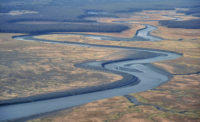At an April 27 hearing, GOP lawmakers blasted the U.S. Environmental Protection Agency for limiting the scope of the Pebble Mine project in Bristol Bay, Alaska, before the project’s developer had formally submitted plans and applied for a permit.
But an EPA official testified that the agency had no preconceived notions about the project. The Clean Water Act gives EPA authority to limit or veto permits for dredge and fill activities that would cause lasting harm to fisheries or watersheds. In 2014, EPA initiated a CWA 404(c) action at the request of several tribes and environmental and community groups concerned about the mine’s potentially devastating impact on the Bristol Bay watershed.
House Science and Technology Committee Chair Lamar Smith (R-Texas) said, “I feel that this process has been subverted, and Pebble Mine has not had its day in court.” Dennis McLerran, regional administrator for EPA’s Region 10, said the EPA first commissioned a peer-reviewed scientific study. EPA also held eight public hearings and received more than one million comments before moving forward with the proposed 404(c) determination.
Critics contend that employees at EPA improperly advocated against the project. But a January EPA Inspector General report found “no evidence that the EPA predetermined the outcome.” Pebble Limited Partnership CEO Tom Collier says the report reflects the agency’s tendency to “minimize the seriousness of its own misconduct.”
Kimberly Williams, a spokeswoman for Nunamca Alukestai, which represents local Alaskan tribes and communities, says she participated in the public hearings, adding, “EPA didn’t advocate one way or another … they were very open and accommodating … to all sides.”



